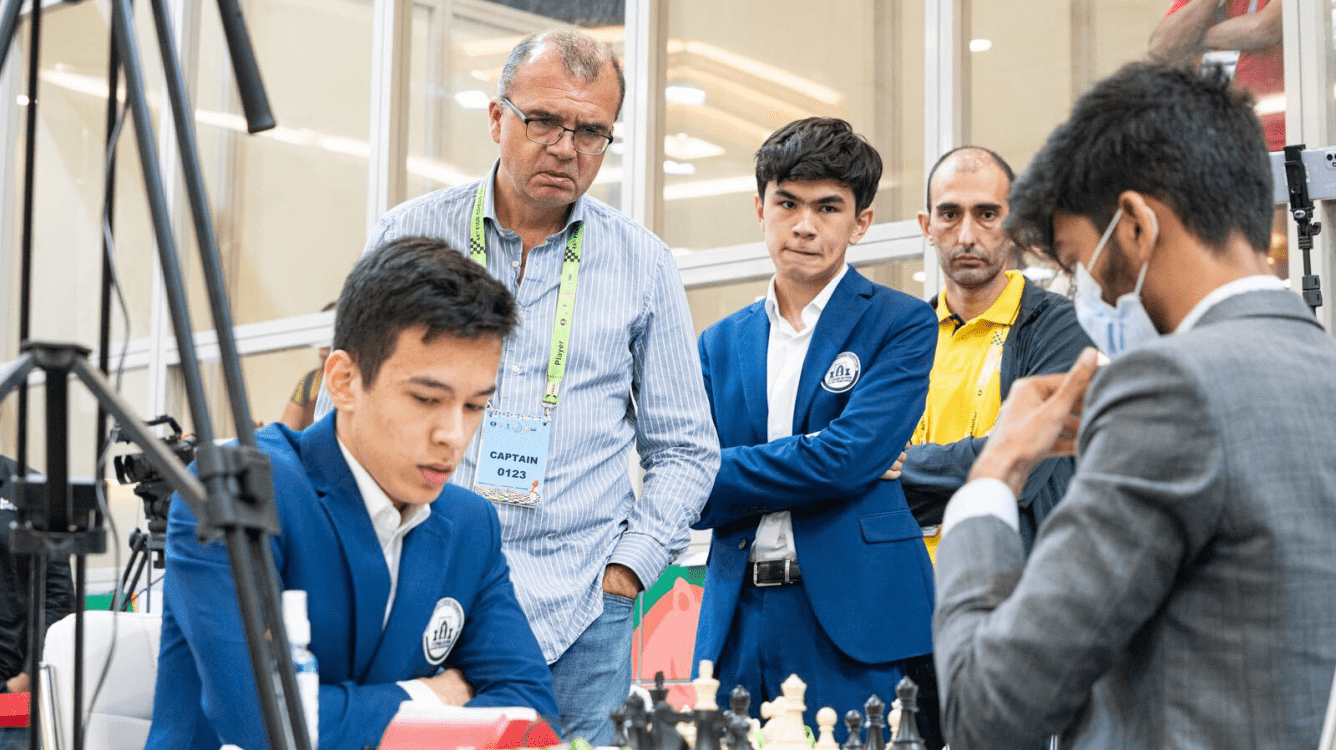
Interview: Captain Ivan Sokolov On Coaching Gold-Winning Uzbek Chess Squad
GM Ivan Sokolov, a former top player himself, was the coach of the gold-winning Uzbek team at the Olympiad in Chennai, India. In an interview with Chess.com, the Dutch-Bosnian grandmaster reveals what it's like to work with prodigies who have taught him something about chess as well.
The 54-year-old Sokolov needs little introduction to our older readers who saw him play at the highest level in the 1990s and early 2000s. He was a constant top-30 player in these two decades and occupied the 12th spot in the world rankings three times. Of all the strong grandmasters who never made it into the top 10, he might be one of the most successful. Besides winning several strong tournaments (for example, Hoogeveen, Selfoss, Sarajevo), he defeated five world champions in classical games: GM Garry Kasparov, GM Vladimir Kramnik, GM Viswanathan Anand, GM Veselin Topalov, and a young GM Magnus Carlsen.
Born and raised in Bosnia (then Yugoslavia, now part of Bosnia and Herzegovina), he was one of the millions who left or fled the country during the Yugoslav wars of the 1990s. He settled in the Netherlands in 1992, which was a much more chess-loving country then when it had five or six annual grandmaster tournaments. His Dutch residence also made it easier for Sokolov to travel to tournaments abroad.
Now divorced with two kids in their 20s, Sokolov currently lives in Amsterdam. He has been earning his living as a chess trainer since 2008. He initially worked with top talents from the former Yugoslavia (GMs Ivan Saric from Croatia, Marin Bosiocic from Croatia, and Borki Predojevic from Bosnia) and later also GM Baskaran Adhiban from India and GM Salem Saleh from the UAE.
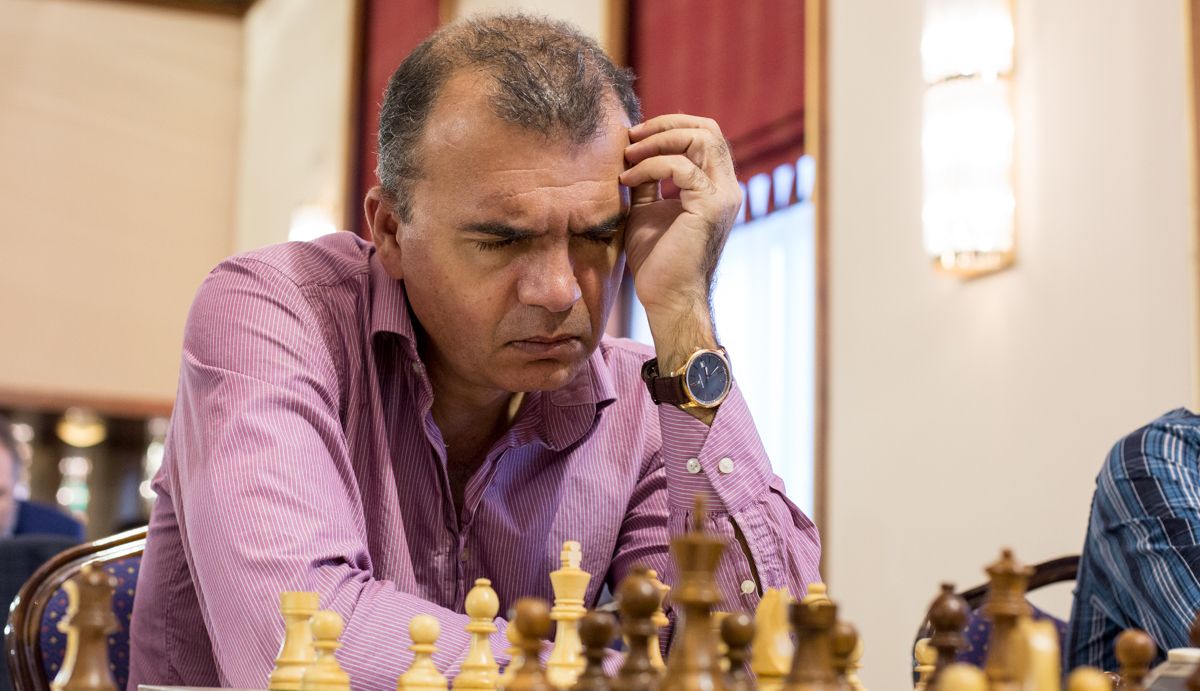
The decision to give up his own chess career and start a full-time job as a trainer in the UAE came in 2013, and there's a nice anecdote connected to it.
"At the start of 2013, I still had a good rating [2663 - PD] and I played in Tata Steel, where my result was much worse than the positions I was getting. My preparation was very good; a few months later I won a number of games in the French league based on my Wijk aan Zee preparation. It was a year of ups and downs, and somewhere in June I got an offer from the UAE Chess Federation to work for them because they were looking for someone to make Salem a better player. He was at that time maybe 2550-2560, a young, talented grandmaster, but they wanted someone to help him to get to the next level. I wasn't sure if I wanted to move to Dubai for a full-time job with, obviously, a fixed salary but no longer being the owner of my own time, in my opinion the biggest plus of being a chess player.
"Then, at the end of August, I was playing the Vienna Open, a huge tournament with something like 600 players. They invited me, I gave a simul as, I guess, the star guest of the event, but somewhere in the middle of the tournament I lost a game to some 2400-rated, talented young player from Turkey [Batuhan Dastan, now a GM - PD]. I finished the tournament with 6.5/9 which was good enough for finishing 16th-30th, and my prize money was, I think, about one hundred euros.
"I went to the airport, I was having a flight to Amsterdam, and they told me: 'The flight is overbooked. Would you like to wait another two hours for the next flight? We will pay you 250 euros.' I said yes, but then I thought: wait a minute. There's something wrong here. I was playing an open tournament for 10 days, the prize money is 100 euros, I have to wait for two hours for a new flight, and they're going to pay me 250. Something is wrong here. So I took this money, ordered a bottle of wine, and analyzed the situation. And having analyzed it, I picked up the phone, called Dubai and asked if their offer was still on the table."
So I took this money, ordered a bottle of wine, and analyzed the situation.
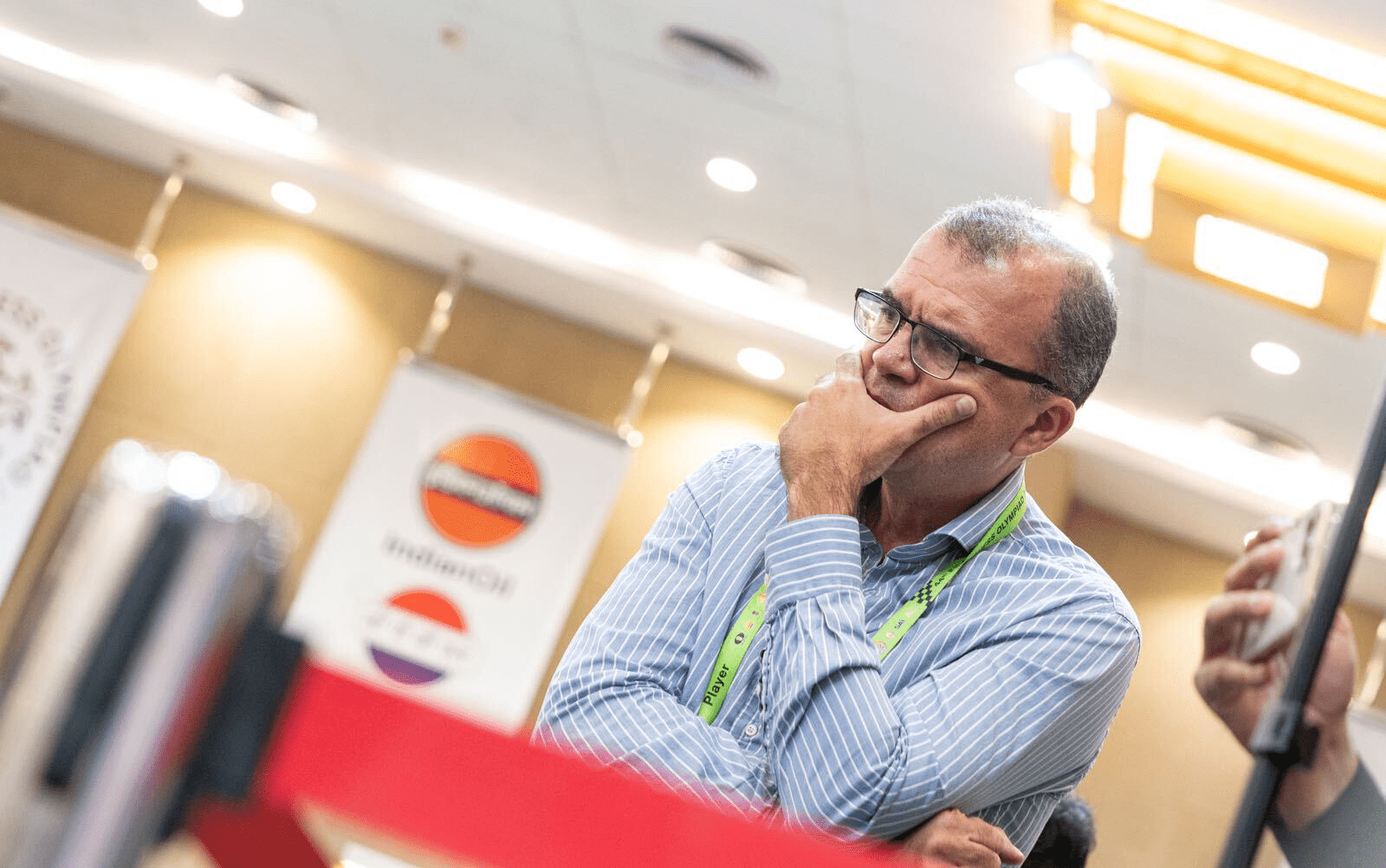
To this day, Sokolov has no regrets about his decision. Things have been going well, and his results as a trainer speak for themselves, culminating in Olympic gold in Chennai.
He worked in the UAE until the summer of 2016, mostly with Salem who soon became the Asian champion. He also coached the UAE team at the 2014 Tromso Olympiad, his first Olympiad as a coach. Before that, he had attended all Olympiads between 1988 and 2012 as a player (representing Yugoslavia, Bosnia and Herzegovina, and the Netherlands), except for Dresden 2008.
Working with Firouzja
About a month and a half before the 2016 Olympiad in Baku, Sokolov quit his job in Dubai and started to coach the Iranian team—a job he held until and including the World Team Championship in 2019. Unlike with the UAE, he did not move to Iran but flew there a few times a year for training sessions that would last a couple of weeks.
Iran then finished in a sensational shared 11th place in Baku, alongside chess powerhouses such as Azerbaijan and China. Two years later, the young team finished in an also very decent shared 15th place, shortly after winning the 2018 Asian Nations Cup ahead of India and China. One of the players then was GM Alireza Firouzja, who would later move to France and eventually become the youngest-ever player to break the 2800 Elo barrier.
Sokolov: "When I came to Iran in 2016, a month before the Olympiad, the country had one established grandmaster: Ehsan Ghaem Maghami. I also had Parham Maghsoodloo, Amin Tabatabaei, I had Firouzja, all of them very young and around 2400 rated at that time. I understood they had big potential but how big, this is always difficult to judge.
"What I noticed with Alireza from the very start, and this made him a little bit different, was that he had a massive dedication.
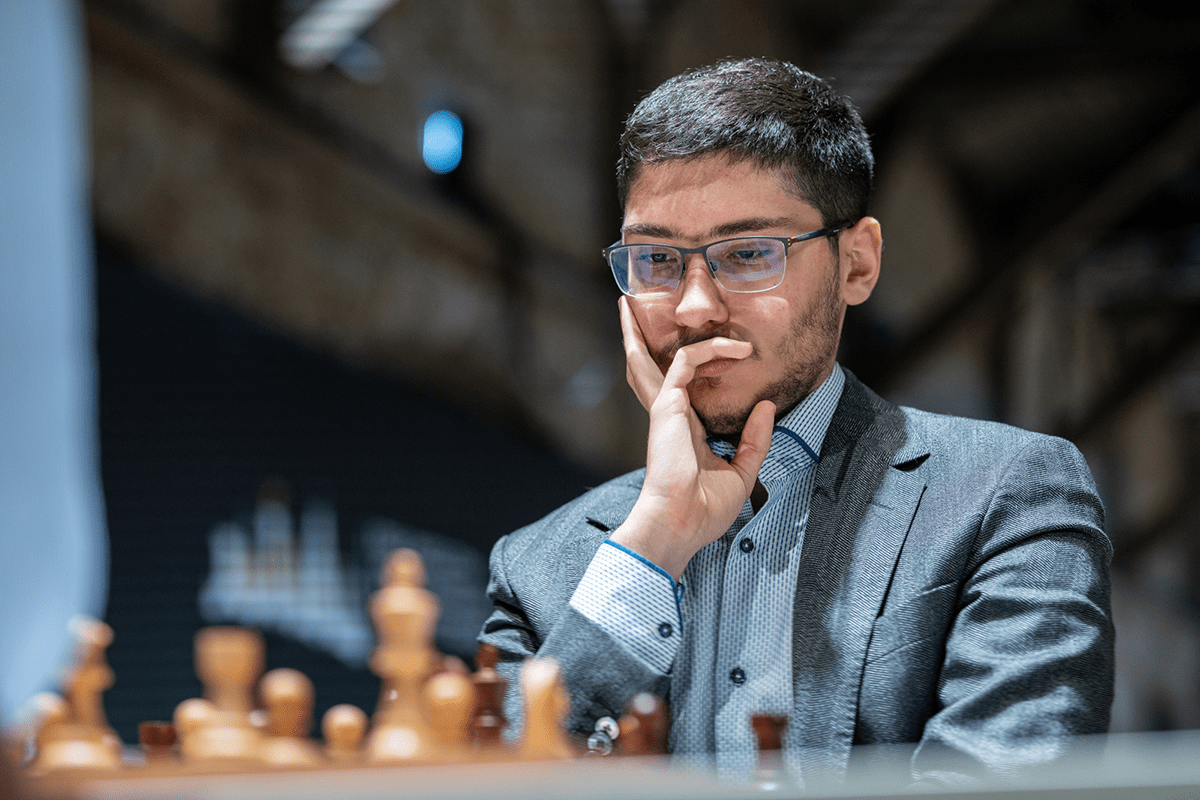
What I noticed with Alireza from the very start, and this made him a little bit different, was that he had a massive dedication.
"Our work day was something like from 10 a.m. to 1 p.m., something like a 2.5-hour break, and then from 3:30 to 6:30 p.m. All of us were staying in a hotel very close to the building of the chess federation.
"Usually, what would happen is that I would finish this work; I would have a break; I would go for a long walk in a park, have lunch, answer my private emails, and come back to work. Usually, when I would come back for the second part, Alireza would already have some novelties and ideas based on what we were looking at in the morning. The same thing, when you finish in the evening, some guys would start chatting or playing video games, but in the morning he would have new ideas, something to tell me based on what we were looking at in the afternoon. So he was working maybe 10 hours a day."
Working with computers
Especially for a classically trained grandmaster like Sokolov, whose 2008 book Winning Chess Middlegames is in that same classical tradition, working with the new generation of players who tend to use a computer more than anything else is both a pleasure and a challenge.
"What I faced, not only with Alireza but also with some other young players that I worked with, is that, for example, they come with a proposal that is very unconventional for a known type of position—unconventional based on old knowledge. I would usually say, if this works, I need to quote my friend GM Jan Timman, who said: 'If it works, I need to learn chess again!' But then I would get a comment like: 'Yes, but the computer loves it.' Then we would do some analysis, and sometimes it would turn out that the computer was wrong, in the sense that the evaluation only works if computers are playing. For humans, the assessment can be different."
Asked for an example, Sokolov described the following pawn structure, which can come from many openings, such as the Scandinavian, the Caro-Kann, the French, the Slav, and so on.
"The common plan is that you either push b2-b4-b5 or you try to come up with the d4-d5 pawn break because by definition White is having the bishop-pair advantage in these kinds of positions. The bishop on c8 went out somewhere and traded itself for a knight.
"One of the new ideas was not to touch anything in the center, try to solidify and make sure there is no easy break, and to simply start pushing g2-g4-g5 and h2-h4-h5 and to have this kind of attack. This is not known in classical books as a common plan in such a position, but it turned out that it can easily be working."
Another example is an unconventional plan for White in the Mar del Plata variation of the King's Indian: playing Kg1-h1, Rf1-g1, and g2-g3, in other words, going against the old adage, Don't play on the wing where you are weaker. It should be said that this plan is not completely new (GM Alex Yermolinsky played it back in 1997!), but it got the attention of strong players as engines seemed to like it.
"You would have been considered completely crazy based on old books," said Sokolov. "In my case, it was Tabatabaei who came to me and said: 'You know, my computer has this idea and I cannot see anything wrong with it.' At first I said: 'Come on, this doesn't make any sense.' But then we started to look, and I realized the computer is right. It makes a lot of sense."
Sokolov has a concrete method that helps players to learn from computers: instead of choosing the top lines given by the engine, a player should always select the move that he would play himself, or he would expect his opponent to play in a position. It may be the fifth choice of moves for the computer, and figuring out what's wrong with your first choice can be highly instructive. "It is a process for me, and obviously working with these people helped my own understanding as to how artificial intelligence works and how often it can put you on the wrong path: that you believe too much in assessments while in one-on-one practical play, it is a little bit different."
Explaining it in another way, Sokolov said: "You can have two approaches. First, you can have a mindset that you try to evaluate a position based on common knowledge, so pawn structure, space, bishop pair, king safety, potential of pawn breaks, possible trade of pieces, do I get a better ending, do I get a worse ending, and once you are done with all these elements, you calculate to try to find the best move and to try to justify your judgement. But of course, it can also go vice versa, that you calculate and based on the variations that you calculate, you try to come up with an assessment of the position.
"I believe I belong to the first school of thought, and I still believe this way is more justified, and it makes it easier for you in practical play to handle the position. But the direct element has become much more important than it ever was, and for this we can thank computers."
Coaching Uzbekistan
During the Sharjah Masters, in May of this year (where Sokolov was a commentator and where many Uzbek players were playing) he was approached by the Uzbekistan Chess Federation to coach the national team. After changing his plan to work as a commentator in Chennai, he accepted and flew to Tashkent, Uzbekistan, at the end of June where he met with the team members who had already been selected for the Olympiad: GMs Nodirbek Yakubboev (20), Javokhir Sindarov (16), Jakhongir Vakhidov (27), and Shamsiddin Vokhidov (20). Board one GM Nodirbek Abdusattorov (17) wasn't there yet as he was playing in Biel.
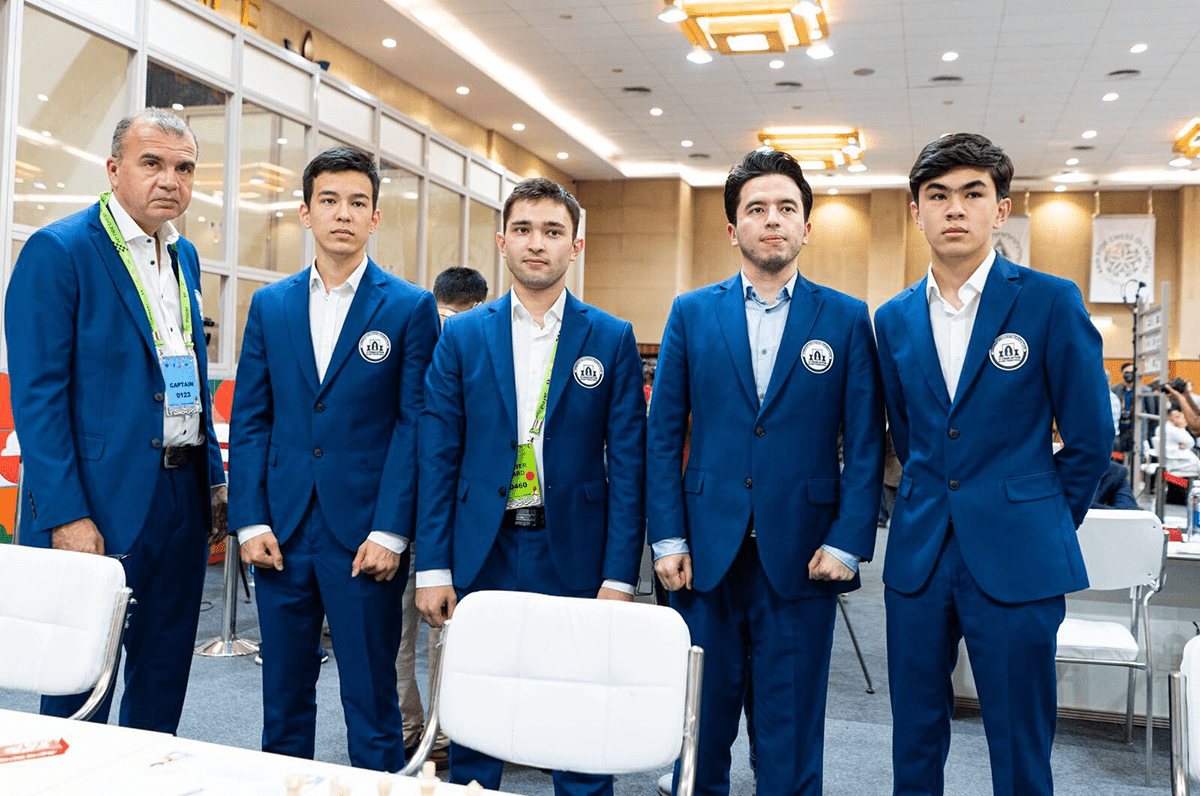
So how did he start?
"I checked their games from the last 12 months, and I did not look that much at the openings. I was more trying to understand them as players, how they function," Sokolov said. "You need to understand how their brains work so that you can help them to make the right choices for themselves. Also, you need to figure out what types of positions suit these players, what are the 'holes' they have, and whether they can easily sidestep them to avoid landing in positions they do not like.
"I said from the very start, even before I took the job: 'Don't expect me to run a cloud Stockfish at depth 50. I am not going to do this. But I can help you become a better player, make the right choices, maybe point out something you should be working on.'"
Instead, Sokolov gave the players lots of middlegame positions, coming from either specific openings or specific types of positions, and also positions where he focused on their decision-making process. He said his database of positions is already about 70 percent new from the time he was working with the Iranian team.
"This is what you need to do as a coach to remain at the top of the game: keep on updating your database in order to understand the middlegame developments and also to understand new opening ideas because your players are going to be facing this in over-the-board play. You need to try to understand it, you need to have an opinion, and you need to know this. You cannot say to a player: I don't know anything about this. It's different from when I was a player, when, as a 1.d4 and 1...e5 player, I couldn't care less about what was happening in the Najdorf or the French Winawer. I did not care at all. Now, I cannot afford this luxury."
Sokolov summed up the different styles of the Olympic gold winners this way:
Abdusdattorov: "Close to Magnus."
Yakubboev: "A more rounded player."
Sindarov: "A pure tactician."
Vakhidov: "An excellent theoretician."
Vokhidov: "Predominantly a tactician."
"In my case, understanding how to work with them helped me also during the Olympiad to make the right opening choices," said Sokolov. "But it was not always so simple, like for example, I was very unhappy when I saw this King's Indian type of position which Sindarov got versus GM Praggnanandhaa R. in our match with India 2.
"The line Praggnanandhaa played was a great choice against Sindarov. He traded pawns on e5, and they got this relatively symmetrical position where White is having a very small plus, which is maybe not even terribly ambitious for White but for a tactical player like Sindarov, it was difficult to handle this kind of position, while a technical player, like Praggnanandhaa, probably felt very comfortable. What happened in the game was that Black was actually trying to solve the situation tactically, which ultimately did not work. This is just one example of choices: White's advantage wasn't big at all, but his position suited him much better in over-the-board play."
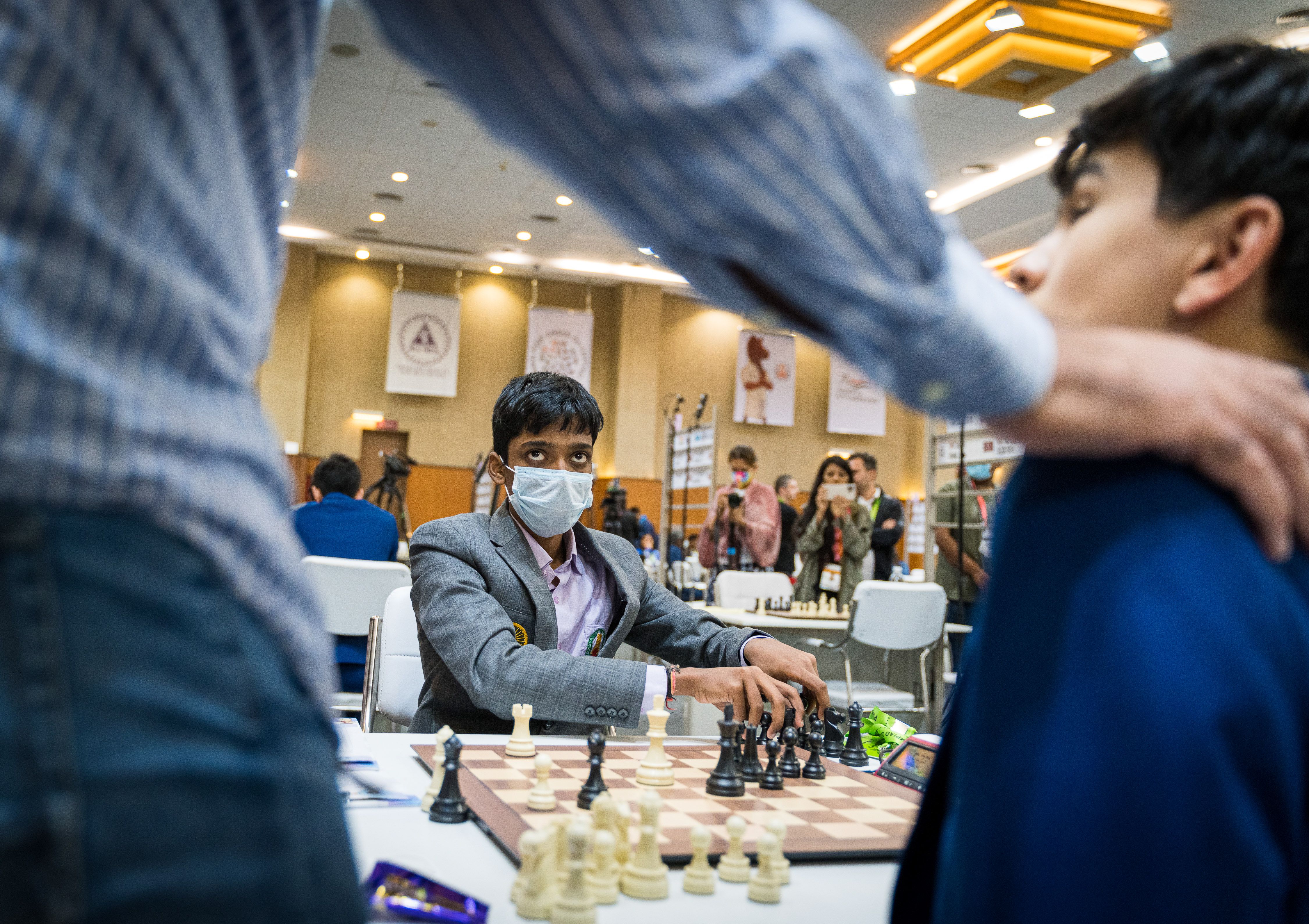
In football or other sports, there is an endless discussion about how much a coach is responsible for the team's results. How does Sokolov look at his role in Uzbekistan's success?
"Let's put it this way. I think as a coach you can help players better if you have been in this situation yourself. I did not win Olympic gold, but I did win Olympic silver [behind Russia, playing board two at the 1994 Moscow Olympiad for Bosnia and Herzegovina - PD]. We did become European Champions in 2005 [playing for the Netherlands - PD]. And as I said, I beat many world champions. Based on those experiences, I think I can help players enormously. But this translates into like Zinedine Zidane or José Mourinho, or what you had in the Netherlands, Johan Cruijff or Louis van Gaal. I'd put my money on Cruijff or Zidane."
Elaborating a bit on the topic, he adds: "What is my influence in percentage points? I don't know. But I know one thing: my successes with Salem, with Iran, and now with Uzbekistan are not a coincidence. This is what I do know."
Before the Olympiad, Sokolov did not really think about winning the gold medal in Chennai. "Objectively, no, but I was thinking a medal could be an option. When I was in Tashkent, they asked me many times if a medal was achievable, but although I was thinking it could be possible, I did not want to build up expectations. But I found it very difficult to see the United States not winning it. I was thinking: What are our chances to be the best of the rest?
"Analyzing the teams, I thought, we are a bit lucky because India is choosing three teams to do well but not a single one to win. Because if they had chosen a team to win, obviously GM Gukesh D. would have been on the first team. All three Indian teams were strong but beatable, just like, for instance, the Netherlands, Germany, France, or Spain.
"I did think our team was underrated, and I was right because I think collectively we won like 80 rating points or something [84.4 to be precise - PD]."
| Bo. | Fed | Title | Name | Rtg | 1 | 2 | 3 | 4 | 5 | 6 | 7 | 8 | 9 | 10 | 11 | Pts. | Games | Rp | rtg+/- |
| 1 | GM | Nodirbek Abdusattorov | 2688 | 1 | 1 | 1 | 1 | 1 | 0 | 1 | ½ | ½ | 1 | ½ | 8,5 | 11 | 2803 | 21,1 | |
| 2 | GM | Nodirbek Yakubboev | 2620 | 1 | 1 | ½ | ½ | 1 | ½ | 1 | 1 | ½ | ½ | ½ | 8 | 11 | 2759 | 20,6 | |
| 3 | GM | Javokhir Sindarov | 2629 | 1 | 1 | 1 | 0 | 1 | ½ | ½ | 1 | 0 | ½ | 6,5 | 10 | 2655 | 7,7 | ||
| 4 | GM | Jakhongir Vakhidov | 2564 | 1 | ½ | 1 | 1 | ½ | 1 | ½ | 1 | 6,5 | 8 | 2813 | 25,1 | ||||
| 5 | GM | Shamsiddin Vokhidov | 2552 | 1 | ½ | 1 | 1 | 3,5 | 4 | 2755 | 9,9 |
"The first time I thought we could win a gold medal was actually some time during the rest day because I thought, OK, we have played the United States, and it doesn't look like they are going to win this Olympiad."
When the interviewer semi-jokingly asked whether he kept his players away from the Bermuda Party [a traditional party always held at Olympiads ahead of the rest day], Sokolov answered with a firm yes. "They were very enthusiastic about the Bermuda Party, but I told them: 'Look, you are forbidden to go there, but I am also going to punish myself. This will be the first Bermuda Party since 1988 that I am not going to attend myself. So I am staying in the hotel as well if this is any consolation.' They tried a bit by saying: 'We will only go for a few hours.' But I replied: 'Boys, there is one small problem. I was not born yesterday. Once upon a time I had your age, and I am not buying it. It is not going to happen.' So this was a good decision."
On the rest day, Sokolov told his team that the chances to win the Olympiad were real. He also explained that playing 2-2 against the United States was an excellent result, despite the fact that they had missed a great chance for victory. "I told them: one, we cannot play them again; two, we have a better tiebreak, and this will probably not change; and three, they are going be beating other teams for us while we are going to play teams that are positioned second-best at that moment, while they will clear the road for us. As we know it, it didn't exactly work that way."
Sokolov admitted that the team had its share of "winner's luck" in the match with India 2 in the penultimate round. "We were unbelievably lucky not to lose because, OK, Gukesh spoiled a completely won position. In that match, I had resigned myself to a 3-1 loss, but at some moment I understood something really good could be happening."
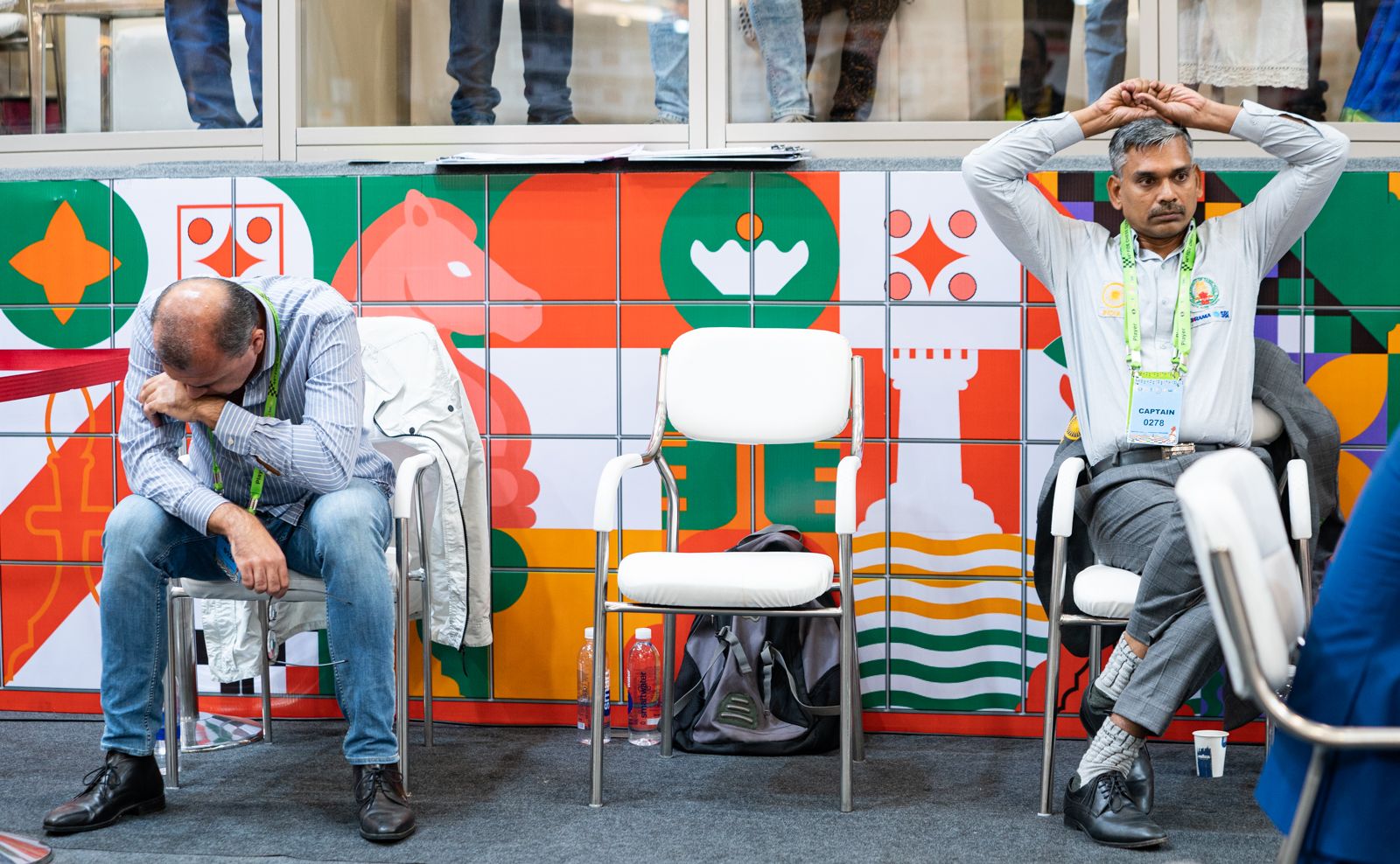
"We got very lucky that Gukesh didn't want to accept the fact that he spoiled a winning position to a draw, and then he pushed unobjectively too hard, and we simply got fortunate in that match."
Here's that fateful encounter between Gukesh and Abdusattorov one more time, annotated as the Game of the Day by GM Davorin Kuljasevic in our round 10 report:
Sokolov: "Even before the piece was blundered, I had the feeling Abdusattorov was going to win. He had a massive advantage on the clock, and also you have this run of play. This is why it's much easier for a computer to defend lousy positions than for humans. How can Gukesh take out of his mind the position that he had 20 moves earlier? It's completely impossible because he is a human."
At the time of this publication, Sokolov is traveling back to Tashkent to discuss continuing his work with the Uzbek players, and it now seems quite likely to continue. In fact, he will probably be welcomed at the airport as a hero.
When the final match was over, the phone of one of the officials of the Uzbekistan Chess Federation rang. On the other end of the line was none other than Uzbekistan's President Shavkat Mirziyoyev to congratulate everyone. Sokolov could not comment on the accuracy of media reports that suggest each player will receive $55,000 and a car back home, but he noted that for some players the actual sum is considerably higher. With a contractual bonus for the Olympic gold, Sokolov himself also receives an extra reward.
The next Olympiad is in two years from now in Budapest, Hungary, where the young Uzbeks will be even stronger, while entering the competition with a whole different mindset. Playing as the defending champions will be a different situation for them. Two years after that, in 2026, the Olympiad will then be on home soil in Tashkent—Uzbekistan won the bid to host the event at the FIDE Congress during this Olympiad.
Correction: An earlier version of this article erroneously stated that Iran won the 2016 Asian Team Championship. The article has been corrected to state the 2018 Asian Nations Cup.


